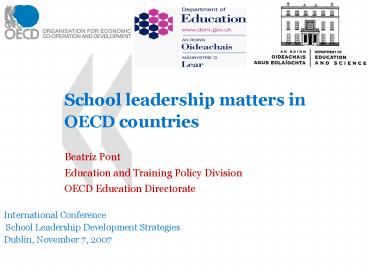School leadership matters in OECD countries
1 / 15
Title:
School leadership matters in OECD countries
Description:
Ireland: 18% of those participating in induction felt prepared for post ... Innovative case studies: The Victoria, Australia and Austria case studies ... –
Number of Views:47
Avg rating:3.0/5.0
Title: School leadership matters in OECD countries
1
- School leadership matters in OECD countries
- Beatriz Pont
- Education and Training Policy Division
- OECD Education Directorate
International Conference School Leadership
Development Strategies Dublin, November 7, 2007
2
Background The ISL activity
Started in early 2006 brainstorming on key
topics to analyse
- Korea
- The Netherlands
- New Zealand
- Norway
- Portugal
- Slovenia
- Spain
- Sweden
- United Kingdom (England)
- United Kingdom (N. Ireland)
- United Kingdom (Scotland)
- Australia
- Austria
- Belgium (French)
- Belgium (Flanders)
- Chile
- Denmark
- Finland
- France
- Hungary
- Ireland
- Israel
Network of experts
International organisations
3
The objectives
- To provide policy-makers and others with timely
analysis to help formulate school leadership
policies leading to improved teaching and
learning - Synthesising research on issues related to
improving leadership in schools - Identifying innovative and successful policy
initiatives and practices - Facilitating exchanges of lessons and policy
options among countries and - Identifying policy options for governments to
consider.
4
Key issues to respond to
- What are the roles and responsibilities of school
leadership - How to best develop effective school leadership
5
Complementary ways of looking at school
leadership
- Analytical strand Country Background Reports to
focus on Country Background reports Policies and
structures that impact on the role and
development of effective school leadership
(January 2007) - Innovative practices strand Case studies to
innovative practices - New models of school organisation and management
that distribute leadership roles and
responsibilities in innovative ways (UK October
06, Finland, January 07 Belgium April 07) - Conference in England July 2006
- Promising programmes and practices to prepare and
develop school leaders (Austria, April 07,
Australia, Aug 07) - Conference in Dublin November 2007
6
Outputs and calendar of the Activity
7
Why is school leadership a policy issue?
- Evidence shows that
- Principals have an indirect impact on schooling
outcomes - Principals are important for school reform
- Pressing issues of attracting, training and
developing good leaders as well as replacing
existing ones. - Shortages of high-qualified school leader
candidates across countries. Either for
retirement reasons or for lack of attractiveness
to the position - At the same time
- Rising expectations of schools and schooling
(knowledge economy, globalisation, migration, ) - Greater accountability for schools and principals
- Changing systems and school environments
(decentralisation and autonomy)
8
Todays focus Professionalising school leadership
- Concerns related to the quality of school leaders
- Many principals complain about lack of training
and development - Denmark, 90 felt need for mandatory training
- Ireland 18 of those participating in induction
felt prepared for post - International research evidence stress the
significance of school leadership preparation for
school improvement (Bush and Jackson, 2002
Møller, 2006) - Research evidence also shows some key features to
successful training programmes - Mentoring and coaching/collegial work
- Work based learning
- Coherence in curriculum
- Focus on leadership for learning
- Different approaches to training across
countries, not necessarily consistent
9
Todays focus Professionalising school leadership
- The context of leadership development
- Almost all principals or candidates have received
teacher training - Participation in training can depend on the
formal requirements for school leaders selection - The length of tenure in the position can have
strong influence in the type of training
provided. - The approaches
- Skills development prior to becoming principal
(System wide pre-service training) - Encouraging induction programmes
- Promoting skills development on the job (training
for acting principals)
10
Leadership development approaches
11
Todays focus Professionalising school leadership
- The practice
- There is a wide range of approaches and support
- Timing varies from 2 months to 2 years part time
- Content varies from procedural to school reform
- Wide range of institutions providing training
- Quality control
- Difficult to measure the impact
- need to develop a solid base of empirical
research to inform design - This conference will help us understand the
practice better - Innovative case studies The Victoria, Australia
and Austria case studies - Country roundtable discussions
12
School leadership The policy
13
School leadership The policy
14
School leadership the policies
15
- activity documents to be found in
- http//www.oecd.org/edu/schoolleadership
- Thank you very much.
- Beatriz.pont_at_oecd.org































